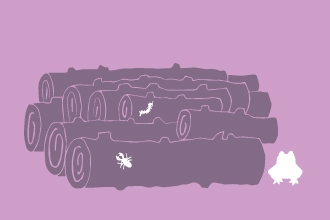As winter gets underway and we complain about the mud and the muck, consider how much worse things could be without nature’s waste recyclers.
Every ecosystem has an ‘energy cycle’; energy in the form of nutrients and minerals flows from one level in the food chain to the next. Plants and algae use solar energy to manufacture their food via photosynthesis; plants and algae are then eaten by herbivores; herbivores are eaten by carnivores, and larger carnivores eat the smaller ones. These feeding stages are called ‘trophic levels’ and couldn’t function without efficient decomposition and recycling of waste products.
Decomposition can be assisted by mammals, birds, insects, molluscs, millipedes, woodlice, earthworms, fungi, moulds, parasites and bacteria. The initial stage of decomposition may start when a dead leaf is colonised by mould and fungi, or when a rabbit carcass is scavenged by a Carrion Crow, enabling flies and beetles to access the nutrients within.
The final stage of decomposition involves the disintegration of organic matter at a chemical level, so that only the component molecules remain. These molecules are then absorbed by plants and algae… and so the cycle continues.




